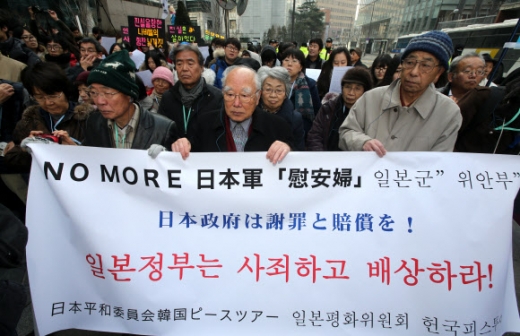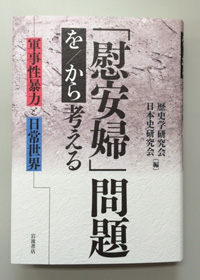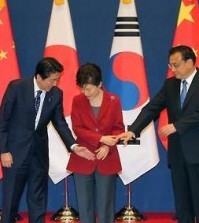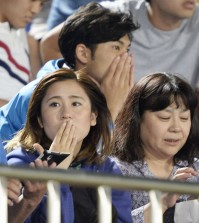- California Assembly OKs highest minimum wage in nation
- S. Korea unveils first graphic cigarette warnings
- US joins with South Korea, Japan in bid to deter North Korea
- LPGA golfer Chun In-gee finally back in action
- S. Korea won’t be top seed in final World Cup qualification round
- US men’s soccer misses 2nd straight Olympics
- US back on track in qualifying with 4-0 win over Guatemala
- High-intensity workout injuries spawn cottage industry
- CDC expands range of Zika mosquitoes into parts of Northeast
- Who knew? ‘The Walking Dead’ is helping families connect
Japanese scholar prods own country to face up to WWII misdeeds towards S. Korea

Members of the Japan Peace Committee, a Japanese civic group, hold a rally in front of the Japanese Embassy in Seoul, Feb. 4, to call on the Tokyo government to apologize for coercing Asian women into sex slavery for Japanese troops during World War II. The banner reads: “No more ‘comfort women’ for the Japanese military. The Japanese government should apologize and compensate the victims.” “Comfort women” is a euphemism for the wartime sex slaves. (Yonhap)
By Lee Min-hyung
A liberal Japanese history professor has called on Korea and Japan to step up critical history education to enable the two nations to have a better understanding of wartime atrocities and promote world peace.
“An ongoing and critical history education that goes beyond nationalist imperatives is absolutely necessary,” said Yoko Nagahara, a professor in the department of contemporary history at Kyoto University’s Graduate School of Letters.
Nagahara is among historians belonging to the Historical Science Society of Japan who issued a statement in October criticizing the Japanese government for its stance on wartime sexual slavery.
The society, one of the most important organizations of historians in Japan, has about 2,000 members. It is committed to promoting research based on sound scholarly methods and facts. It is independent of the authorities.
She said members were making efforts to stop the policy of Prime Minister Shinzo Abe’s government to introduce Japanese history as a compulsory subject, which would replace world history that has been compulsory at high schools.
“We are deeply committed to promoting history education that helps pupils to understand Japanese and Asian history as part of world history,” she said. “This is also our expectation of history education in Korea.”
“It might look like going a long way round, but we understand this to be a solid and reliable way to change current policies and perhaps even the current parties in power.”
Nagahara has also called for solidarity between Koreans and Japanese in fighting the right-wing Tokyo government’s attempt to deny wartime sexual slavery and other atrocities committed by Imperial Japan.

The Historical Science Society of Japan and the Japanese Society for Historical Studies co-authored “The Comfort Women Issue” (Iwanami Shoten Publishers 2014) to help people have a better understanding of wartime sexual slavery. (Courtesy of Iwanami Shoten Publishers)
“One of the most powerful ways is through acts of solidarity between Korean and Japanese citizens,” she said. “The situation where both people hate each other gives this government a good chance to go further in the direction of militarization.
“We hope Koreans understand that Abe doesn’t represent the majority of Japanese people.”
She said there was a wide range of Japanese citizens striving to promote mutual understanding with Korean citizens, as well as those of other Asian countries, despite the Abe government’s use of history as a tool of nationalist mobilization.
“It’s our ideal that Asian people one day share the understanding of regional and world history, including admitting each other’s difference in interpretation, and play a role in promoting peace in the world,” she said.
Nagahara said she and her colleagues would do their best in history research and education to contribute to the ideal.
Explaining why the historians issued the statement, Nagahara said it was a professional imperative of honest historians to fight the government and the media’s move to deny that “comfort women” existed.
“Comfort women” is a euphemism for Asian women forced into sexual slavery for Japanese troops during WWII. It is hard to confirm the exact number, but it is estimated that more than 200,000 girls and women, many of them Koreans, were forced into military brothels.
“The purpose of the statement is to convey the Japanese historians’ standpoint to the media and our colleagues overseas on the extremely violent character of the comfort women system that actually existed in our past,” she said.
“We, the committee members of this society, are deeply concerned about the Japanese government’s stance on the issue and its coverage in the media, particularly since last summer when the Asahi Shimbun retracted some of its former articles on the issue,” she added.
She said Abe and his government, and certain sections of the media, wanted to strengthen nationalist passions among Japanese people in an attempt to ensure support for their policy of moving “away from the post-war regime.”
Nagahara noted that the government was apparently trying to abandon the principles of the Constitution, Article 9, among others, so the Japanese military (the Self-Defense Forces) could be deployed overseas, and aligning Japan with the imperatives of the U.S. government and military.
She said the government seemed not to comprehend the nature of the Constitution as an international commitment, to Asian countries in particular, in acceptance of the results of WWII.
“Admitting the wrongdoings of the past and restoring a good relationship with the victims of Japanese imperialism through apology and reparation seem to be something beyond their understanding.”
The liberal historians said the Abe administration was attempting to take the people of Japan, and the rest of the world for fools, by upholding the Kono Statement on one hand while casting doubt on its substance on the other.
“Their actions are also further escalating tensions with Japan’s East Asian neighbors, who want Japan squarely to face up to its past wrongdoings,” they said.
The Kono Statement, released by then Chief Cabinet Secretary Yohei Kono in 1993, officially acknowledges the involvement of the Japanese military in the establishment and operation of military brothels, including the forced recruitment of women.
The historians said it was known there had been forced recruitment in Semarang, Indonesia, and Shanxi Province, China, among many other places.
They added that there were many testimonies from victims attesting to such coercion on the Korean Peninsula.
“The overall body of historical evidence leaves no doubt that the Japanese military authorities were involved both directly and indirectly in the forced recruitment of women,” the historians said.
They said it was important to remember that not only were victims forcibly recruited, they were subject to extreme violence as sex slaves. And recent historical research had demonstrated that the system of military sexual slavery was part of an imperialist structure that legitimatized discrimination.
The historians urged the Abe administration to face up to the damage Japan had inflicted and sincerely address the victims.

















kelly
November 24, 2017 at 11:23 AM
Very nice and always successful.
This is a very good article.
I’m waiting for you the other article.
togel online